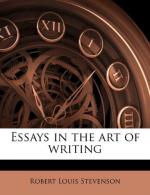THE GENESIS OF ‘THE MASTER OF BALLANTRAE’
I was walking one night in the verandah of a small house in which I lived, outside the hamlet of Saranac. It was winter; the night was very dark; the air extraordinary clear and cold, and sweet with the purity of forests. From a good way below, the river was to be heard contending with ice and boulders: a few lights appeared, scattered unevenly among the darkness, but so far away as not to lessen the sense of isolation. For the making of a story here were fine conditions. I was besides moved with the spirit of emulation, for I had just finished my third or fourth perusal of The Phantom Ship. ‘Come,’ said I to my engine, ’let us make a tale, a story of many years and countries, of the sea and the land, savagery and civilisation; a story that shall have the same large features, and may be treated in the same summary elliptic method as the book you have been reading and admiring.’ I was here brought up with a reflection exceedingly just in itself, but which, as the sequel shows, I failed to profit by. I saw that Marryat, not less than Homer, Milton, and Virgil, profited by the choice of a familiar and legendary subject; so that he prepared his readers on the very title-page; and this set me cudgelling my brains, if by any chance I could hit upon some similar belief to be the centre-piece of my own meditated fiction. In the course of this vain search there cropped up in my memory a singular case of a buried and resuscitated fakir, which I had been often told by an uncle of mine, then lately dead, Inspector-General John Balfour.




